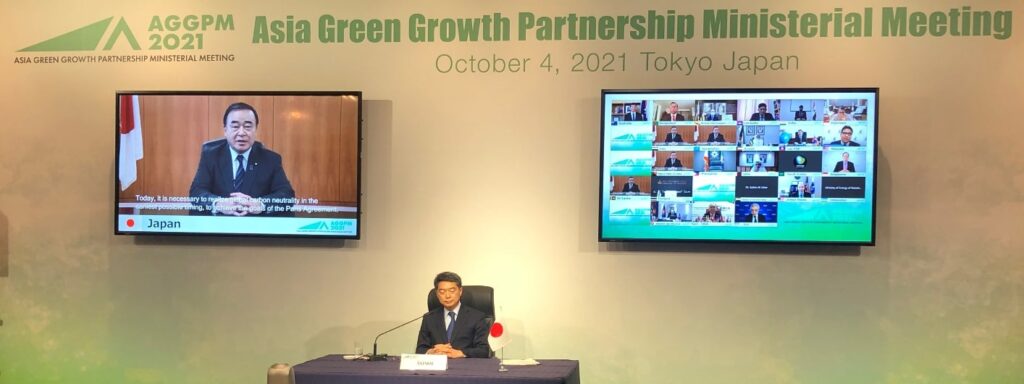October 4, 2021
On October 4, the Ministry of Economy, Trade and Industry (METI) held the first Asia Green Growth Partnership Ministerial Meeting online.
The meeting was attended by ministries from 20 countries and delegates from 3 international organizations in Asia and other parts of the world. The participants discussed the need to achieve green growth and accelerate various and realistic energy transitions toward achieving global carbon neutrality in the earliest possible timing. In particular, they affirmed that there is no single pathway to achieve carbon neutrality, but rather there are diverse pathways for each country, and that promoting innovation and actively engaging Asian countries will be important.
The outcomes of the meeting have been published as the Chair’s Summary.
Outline of the meeting
In order to achieve simultaneous economic growth and carbon neutrality in Asia, it will be necessary to achieve “green growth” and accelerate various and realistic energy transitions. This aim of the Asia Green Growth Partnership Ministerial Meetings will be to further discuss these kinds of ideas among the participating countries and international organizations and spread the message to the international community. This was the first meetings, and was hosted by Japan.
It was attended by ministries and delegates from a total of 23 countries and international organizations, Asian countries including ones in the Middle East, namely, Australia, the United States, the ASEAN Secretariat, the Economic Research Institute for ASEAN and East Asia (ERIA), and the International Energy Agency (IEA) .
At the beginning of the meeting, Minister Kajiyama delivered a video message in which he emphasized that efforts and contributions from each country will be essential to achieving global carbon neutrality, and that each country needs to work toward achieving green growth and accelerating energy transitions in Asia, and treating action on climate change as an opportunity.
He also highlighted that there is no single pathway to achieve carbon neutrality in Asia, but rather there are diverse pathways for each country, and that actively engaging them and promoting innovation will be important. In doing so, he reaffirmed Japan’s intention to provide a wide range of assistance based on the Asia Energy Transition Initiative (AETI) announced this May, and introduced results of cooperation that have already materialized, such as individual dialogues with countries toward formulating roadmaps.
Dr. Fatih Birol, the Executive Director of IEA also delivered opening remarks and stated that there is no one size fits all for clean energy transitions and the pathway will be shaped by each country’s circumstances and capabilities. In addition, he highlighted that 3 technologies: CCUS, low carbon fuels such as hydrogen and ammonia and LNG would play an important role for energy transitions, and that the pace and pathway in Asian countries might be different from that of other regions because Asia will continue to face a rapid economic growth.

<Reference: AETI>
- Support for formulating energy transition roadmaps
- Presentation and promotion of the concept of Asia Transition Finance
- US$10 billion financial support for renewable energy, energy efficiency, CCUS and other projects
- Technology development and deployment, utilizing the achievement of Green Innovation fund
- Human resource development, knowledge sharing and rule-making on decarbonisation technologies
In the meeting, the countries and international organizations expressed their endorsement of diverse and realistic energy transitions that make use of various options by taking into account the circumstances of each country, and toward Japan’s support based on the AETI. They also introduced their own efforts toward promoting energy transitions. The participants also underlined that achieving global carbon neutrality will require innovation and finance to support energy transitions in each country, and expressed their expectations toward cooperation from the international community. The Chair’s Summary was published on the basis of these discussions in the meeting.
<The key points of the Chair’s Summary>
- We acknowledged the need for all countries to make efforts and contributions to achieve global carbon neutrality in the earliest possible timing in pursuing the Paris Agreement goals.
- We agreed that there is no single pathway to achieve carbon neutrality, but rather there are diverse pathways for each country.
- We shared the importance of taking all fuel and all technologies approach to enhance energy transitions while meeting the growing energy demand in Asia. To this end, we confirmed that it is necessary to promote innovations of various kinds that contribute to energy transitions, through support for the research and development, and early commercialisation, of innovative technologies.
- We welcomed the readiness of relevant international organisations and research institutes such as the IEA and ERIA to share knowledge and provide support to each country in considering its own pathway for energy transitions.
- We welcomed Japan’s “Asia Energy Transition Initiative (AETI)”.
- We recognised the importance of establishing mechanisms to attract investment and funding for various lower emissions and energy efficiency technologies and projects, positioned on the pathways outlined by each country, in order to achieve energy transitions in Asia.
- We acknowledged that it is essential to establish a framework that financially supports technologies and projects contributing to energy transitions, and to explore the study of the concept of “Asia Transition Finance (ATF)” by the “Asia Transition Finance Study Group” led by private financial institutions.
- We recognised the need for the working with relevant policymakers, private and academic sectors across countries to accelerate energy transitions in Asia.
- We looked forward to various meetings and workshops toward green growth, based on the discussions at the first AGGPM, noted Japan’s initiative to convene the second AGGPM in 2022.
Japan will continue to steadily implement and support a variety of initiatives and projects toward achieving carbon neutrality in Asia in the earliest possible timing, to use many different opportunities to actively spread to the international community the message about the importance of energy transitions that meet the circumstances of each country and of speeding them up, while working closely with the countries concerned.

